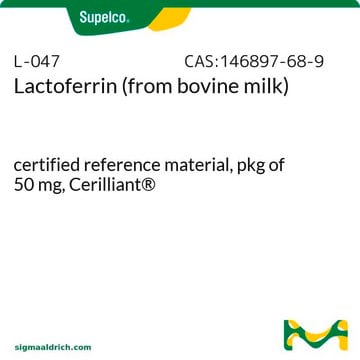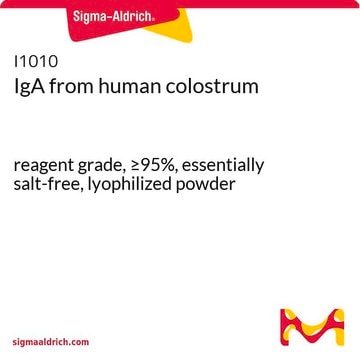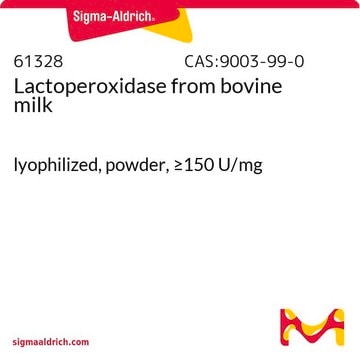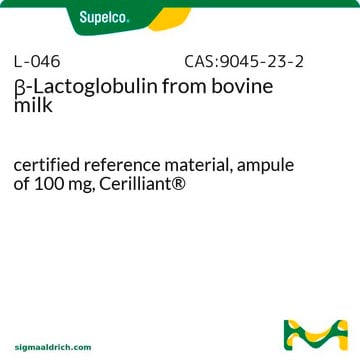L4765
Lactoferrin from bovine colostrum
≥85% (SDS-PAGE)
Sign Into View Organizational & Contract Pricing
All Photos(1)
About This Item
Recommended Products
biological source
bovine colostrum
Assay
≥85% (SDS-PAGE)
form
powder
mol wt
~90 kDa
technique(s)
electrophoresis: suitable
ion chromatography: suitable
impurities
salt, essentially free
solubility
H2O: soluble 5 mg/mL
UniProt accession no.
storage temp.
2-8°C
Gene Information
cow ... LTF(280846)
Looking for similar products? Visit Product Comparison Guide
General description
Lactoferrin from bovine colostrum corresponds to a molecular weight of 80 kDa. It is a glycosylated protein and belongs to the transferrin family. Bovine lactoferrin has N and C-terminal lobes homologous to human lactoferrin.
Application
Lactoferrin from bovine colostrum has been used as standard protein in sodium dodecyl sulfate (SDS)- polyacrylamide gel electrophoresis (PAGE) for the quantification of IgG samples. It has also been used to test its effect in inducing autoimmune pancreatitis.
Lactoferrin from bovine colostrum was used in the characterization of lactoferrin (lf) from colostral whey using anti-lf antibody immunoaffinity chromatography. It was used in the isolation of lactoferrin from bovine colostrum using ultrafiltration coupled with strong cation exchange chromatography.
Biochem/physiol Actions
Lactoferrin is an iron binding protein. It is structurally similar to transferrin, the plasma iron transport protein; but lactoferrin has a much higher affinity for iron (250 fold). It is very abundant in colostrum and small amounts can also be found in tears, saliva, mucous secretions and in the secondary granules of neutrophils. It is made by mucosal epithelium and neutrophils and is released by these cells in response to inflammatory stimuli. Bacterial growth is inhibited by its ability to sequester iron and also permeabilize bacterial cell walls by binding to lipopolysaccharides through its N-terminus. Lactoferrin can inhibit viral infection by binding tightly to the viral envelope protein. This prevents cell-virus fusion by blocking the binding domain. Lactoferrin appears to activate host defense systems in part by stimulating the release of interleukin-8, a neutrophil activator. It may also be involved in antibody and interleukin synthesis, lymphocyte proliferation and complement activation.
Storage Class Code
11 - Combustible Solids
WGK
WGK 3
Flash Point(F)
Not applicable
Flash Point(C)
Not applicable
Personal Protective Equipment
dust mask type N95 (US), Eyeshields, Gloves
Certificates of Analysis (COA)
Search for Certificates of Analysis (COA) by entering the products Lot/Batch Number. Lot and Batch Numbers can be found on a product’s label following the words ‘Lot’ or ‘Batch’.
Already Own This Product?
Find documentation for the products that you have recently purchased in the Document Library.
Customers Also Viewed
Isolation of lactoferrin from bovine colostrum by ultrafiltration coupled with strong cation exchange chromatography on a production scale
Lu RR, et al.
Journal of Membrane Science , 297(1-2), 152-161 (2007)
Erika N Biernbaum et al.
JDS communications, 2(3), 92-97 (2021-03-12)
Improper storage conditions or processing of milk leads to potential spoilage and illness, due in part to temperature abuse, allowing bacteria present to grow and spoil the product. However, certain proteins naturally found in raw milk, such as lactoferrin, have
Andrew S Cooke et al.
PeerJ, 8, e8631-e8631 (2020-05-06)
Promoting and maintaining health is critical to ruminant welfare and productivity. Within human medicine, faecal lactoferrin is quantified for routine assessment of various gastrointestinal illnesses avoiding the need for blood sampling. This approach might also be adapted and applied for
Serena Belegrinou et al.
Langmuir : the ACS journal of surfaces and colloids, 24(14), 7251-7261 (2008-06-14)
The interaction of the proteins bovine serum albumin (BSA), lysozyme (Lys), lactoferrin (Lf), and fibronectin (Fn) with surfaces of protein-resistant poly(ethylene oxide) (PEO) and protein-adsorbing poly(acrylic acid) (PAA) fabricated by plasma-enhanced chemical vapor deposition has been studied with quartz crystal
Isolation of lactoferrin from bovine colostrum by ultrafiltration coupled with strong cation exchange chromatography on a production scale
Rong Rong Lu, Shi Ying Xu, Zhang Wang, Rui Jin Yang
Journal of Membrane Science , 297, 152-161 (2007)
Our team of scientists has experience in all areas of research including Life Science, Material Science, Chemical Synthesis, Chromatography, Analytical and many others.
Contact Technical Service














